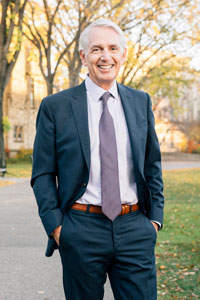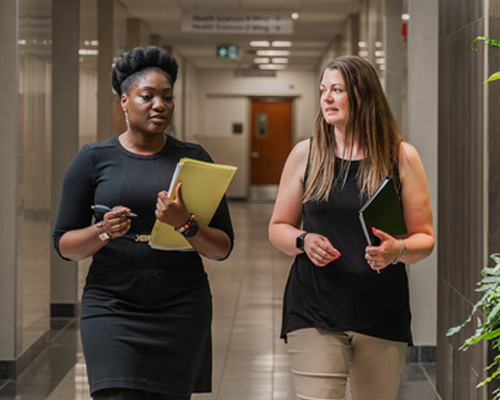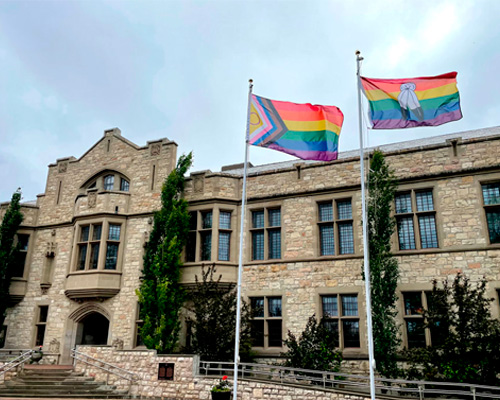Aspirations
A university for everyone. The University of Saskatchewan aspires to be what the world needs. This goal is borne of our bold optimism, our welcoming community and, our belief that together, we have the courage and determination to address humanity’s greatest challenges. It is an outward-looking aspiration nourished by our strong Saskatchewan roots and relationship with the land. It is an aspiration strongly connected to the gifted Indigenous name of our University Plan 2025: nīkānītān manācihitowinihk | ni manachīhitoonaan (“Let us lead with respect”).
It is also an aspiration that critically depends on action toward Equity, Diversity and Inclusion (EDI). Through EDI we will help activate the principles that are core to our University Plan:
- we will achieve greater diversity, welcoming people on different journeys and pursuing a deeper understanding of humanity
- we will enhance sustainability, bringing mindfulness, respect and reverence to all our relations including with each other and with the land
- we will power creativity, open to the possibilities for growth and change that inspire imagination and invention
- we will strengthen connectivity, tied to each other by shared values, intentions and ambition
We took the first step by formalizing our commitment to the principles of equity, diversity, human dignity and manacihitowin in our EDI Policy. We gathered a Working Group and Advisory Committee representing the perspectives of individuals across the gender spectrum, people with differing abilities, individuals who identify with the 2SLGBTQIA+ community, Indigenous people, individuals who identify as persons of color, and individuals with a wide range of spiritual beliefs. We consulted extensively with students, staff, faculty and leaders across our campus community to create our EDI Policy and this Framework for Action. We listened and we learned.

"This framework does not tick a box – it shows us the way. It will guide our university community in realizing our goal of an equitable, diverse and inclusive future for everyone."
- Peter Stoicheff, USask President
What EDI Means to Us
As we continue our journey to create an equitable, diverse and inclusive university we must recognize that equity, diversity and inclusion mean different things for different people and that people come to this strategy with different degrees of understanding of the principles it aims to advance.
Therefore, to lay the foundation for this EDI framework, we hope to build a shared understanding of and appreciation for what the following EDI concepts mean to all of us:
| Definitions1 | What it Means to USask and Our EDI Framework | |
| Equity | Taking the range of human attributes and qualities into account and providing each individual with what they need to be successful. |
We know that people at our university come from different countries, cultures and circumstances that can provide advantages or disadvantages—be it when applying for admission, gaining employment, being rewarded or realizing success. We must do everything we can do to ensure that each person has access to the opportunities and supports needed to have a fair chance of reaching their full potential in their academic and professional pursuits. |
| Equality | Providing each individual with the same or similar opportunities and ensuring fairness in processes and outcomes so that each individual has an equal opportunity to make the most of their abilities. | We acknowledge that current systems and structures can spread inequities, racism and oppression across the university and we are committed to rebuilding these structures to ensure that we treat our students, faculty, staff and leaders in a way that is fair, just and free of bias, discrimination and prejudice. |
| Diversity | The range of human differences, including diverse talents, perspectives, backgrounds, worldviews, ways of knowing, skills, and abilities. | We are committed to building a diverse community of students, faculty and staff. This is not only the right thing to do to reflect the communities that we serve. When combined with a commitment to equity and inclusion, it is how we can unlock the full potential of the curiosity, creativity and innovation that will drive academic, teaching and professional excellence across our university. |
| Manācihitowin/ Manaachihitootaak |
A Cree/Michif phrase that translates to ‘let us respect each other’. | Understanding that creating meaning for this concept within the context of our EDI Framework involves on-going teachings, we will work with the Office of the Vice-Provost Indigenous Engagement (OVPIE) and create opportunities for advice from the Wise Ones, a circle of Elders, Knowledge Keepers and Knowledge Holders who guide and support the work of OVPIE. |
| Inclusion | Ongoing practice of embracing equity, diversity, and manācihitowin and taking action to create a supportive and welcoming environment. | We will foster a welcoming, engaging and respectful environment that ensures we are all able to freely express who we are, our opinions and our points of view. We will bring focus to the need to engage, integrate and empower greater diversity among our university’s leaders and decision-makers. |
| Belonging | When each individual is supported, respected, and valued for their identity and unique traits that make them different from each other. Belonging is feeling part of a collective that is co-created by diverse individuals in the university community. | We want all students, faculty members, staff members and leaders to see themselves reflected in our EDI Framework and to feel that they are respected, accepted and supported within our university community. |
| Human Dignity | The right to be safe, valued, respected, and treated ethically. | Through our EDI Framework we will hold our staff, faculty, students and leaders accountable to upholding the fundamental and universal rights of every human to be treated with a level of respect. |
1 The definitions for Equity, Equality, Diversity, and Intersectionality are from the Center for the Study of Social Policy’s Key Equity Terms & Concepts document; the definition for Inclusion is adapted from this source. The definitions for Belonging, Human Dignity and Manācihitowin are from the University of Saskatchewan’s EDI Policy.
Strategic Priorities
Our ambition is to be a university for everyone, one where we all belong and can flourish. To realize this ambition we will concentrate our efforts on advancing six strategic priorities.
Each strategic priority will be advanced by goals that will guide our efforts to embed and reflect EDI across our university. We recognize the needs of our community, the success of our strategies and understanding of EDI will change over the coming years. Therefore, we will leverage data, feedback, stakeholder engagement and continuous learning to inform the evolution of our actions to achieve impact.

Enrich the student experience by increasing the diversity of our student body, appreciating this diversity, and creating environments that foster belonging for all students
To enhance the student experience in learning environments and campus life, we need a student body with a variety of perspectives and worldviews – supported by a community and an environment responsive to their diverse social and academic needs. This requires an authentic appreciation for the complex values, abilities, worldviews and aspirations of our student body and the creation of welcoming and safe environments that foster a sense of belonging.
Goals
- Enrich the student experience with a diversity of perspectives and worldviews among our student body
- Support and enhance academic and social programming, services, extracurricular activities and events that build inclusion and meet the unique needs of our students
- Engage with our student body to understand their diversity and address barriers to learning and participating meaningfully in all aspects of campus life

Embed EDI concepts into our teaching and learning programming, services and activities and evolve our learning environments to be inclusive, accessible and supportive
We all need to be educators and learners in the EDI conversation in order to have the greatest impact. Building capacity to engage and advance EDI through taking responsibility for our own learning, and coming together to deepen our collective understanding and move to action, is key. We must create and sustain environments that support the many ways our educators and learners implement EDI.
Goals
- Ensure we implement the commitments and goals of our Learning Charter (2018) to create and foster inclusive learning environments
- Review and evolve teaching and learning programming, services and activities to reflect cross-cultural knowledges and experiences and foster inclusivity and intercultural understandings
- Create learning environments that are inclusive, accessible and supportive for our educators and learners

Enhance our research excellence by incorporating EDI concepts into research programs, activities and environments and encouraging those with diverse perspectives, worldviews and contributions
We must build a research community that includes diverse perspectives and worldviews, and recognizes EDI as key to excellence in innovation, learning, creativity and discovery. This requires a thoughtful approach to redefining what excellence in research means to the university, integrating the concepts of EDI throughout the research enterprise and uplifting those who offer diverse contributions.
Goals
- Enrich our research community with diverse perspectives and worldviews among our researchers and research teams
- Create and foster research environments and opportunities that are inclusive, accessible, supportive and responsive to the diverse needs of educators and learners
- Integrate EDI concepts into research structures, systems, policies, procedures and processes

Evolve our working environment and workplace culture by incorporating EDI concepts into human resources and talent management processes, decisions and activities
To enhance the experience of leaders, faculty and staff in our university community we require equitable and inclusive work environments that acknowledge EDI as key to excellence, innovation and creativity. The university’s commitment to EDI must be reflected in our employment strategies (i.e., talent management), collective bargaining mandates, safety and wellness resources and our terms and conditions of employment.
Goals
- Enrich our environments by welcoming diversity of thought, perspectives and worldviews from our colleagues
- Integrate EDI concepts into employment strategies, collective bargaining mandates, safety and wellness resources and terms and conditions of employment
- Review and evolve our employment structures, systems, policies, procedures and processes to create a culture of belonging

Be intentional and proactive in challenging the status quo and changing our structures, systems, policies, procedures and processes to include EDI concepts
Systems and culture are closely linked. Our systems include structures, policies, procedures and processes that contribute to creating and maintaining our culture, beliefs and values. To build an inclusive culture where we live, work, learn and discover we must intentionally challenge systems that do not advance EDI and replace them. Creating systems that embrace EDI concepts will reinforce a culture of inclusion and belonging.
Goals
- Engage in an ongoing dialogue to promote understanding of EDI concepts, how to embrace them and how to put them into practice both individually and as a group
- Collect, apply and share quantitative and qualitative data, including stories and experiences, as a basis for understanding and informing change
- Critically reflect on and align our structures, policies, procedures and processes so that they support a culture of inclusion and belonging

Create inclusive, supportive, accessible and safe spaces where everyone has the opportunity to participate meaningfully and experience a sense of belonging
Ensure our physical space reflects the diversity of our students, faculty and staff. To create and sustain an inclusive work and learning environment and foster a sense of belonging we need physical and virtual spaces that are accessible and responsive to the diverse needs of students, faculty and staff.
Goals
- Reflect diverse identities in our icons, signage, artwork and ceremonies
- Enhance accessibility of our physical spaces
- Ensure dedicated and safe spaces for spiritual, social and wellness needs
Framework for Action
This Framework defines our vision for a more equitable, diverse and inclusive university that will be advanced through our strategies and goals. Yet turning our vision into a reality will require us to be concrete and intentional about what we need to do and how we need to do it. We will invest in people and resources to lead activities and efforts that will drive meaningful change across our university community. We will establish appropriate governance structures and ensure roles and responsibilities are clear to hold people – our leaders, in particular – accountable for leading the EDI Framework and implementation. We will commit to action to deliver on our EDI Strategy and create a university for everyone.
We recognize that colleges, schools, departments, research centres, units and university groups are all starting at different points in their EDI journey and will need to chart their own path forward for success. Our approach will ensure that we gather around a shared vision for our future and that we integrate equity, diversity and inclusion across our university in a meaningful, collaborative and sustained way.
The framework for action is a high-level plan to help implement and define the actions that will become the foundation for our progress. While the majority of identified activities or actions are unique to each stage of implementation, there are a core set of cross-sectional activities that will be critical to realizing the objectives among all stages of implementation.
What follows is an overview of the stages of implementation and activities that will help turn our EDI Framework into action.
STAGE 1: Setting the Foundation for our EDI Framework
CURRENT STAGE
A critical first step in our EDI journey will be to evaluate the current status of our university, colleges, schools, departments, research centres, units and university groups when it comes to equity, diversity and inclusion. This will require self-reflection/assessment to identify gaps and opportunities within our strategy. Engagement with our community is also key to understanding the many needs and barriers, as well as to supporting education and awareness-building around EDI.
Key activities defining Stage 1 include:
- Establishing appropriate governance and accountability structures for the EDI Framework, both at the university level and within individual colleges, schools, departments, research centres, units and university groups
- Investing in people, infrastructure (e.g., data/analytical capabilities) and resources (e.g., educational materials) to support implementation of the EDI Framework
- Forming diverse, tailored committees to lead reviews of policies, processes, systems and decision-making frameworks across all facets of the university
- Engaging in comprehensive reviews and taking an inventory of existing policies, processes, systems and decision-making frameworks
- Building awareness of EDI across the university community and encouraging participation and dialogue through outreach and education activities (e.g., seminars, workshops)
- Updating foundational policies at the university to reflect the university’s EDI commitment
STAGE 2: Creating Change through Action
Once we have set the foundation for the strategic priorities and goals in our EDI Framework, we will develop, refine and implement new processes, systems and frameworks to help us achieve our EDI goals and move toward a more equitable, diverse and inclusive university and community.
Key activities defining Stage 2 include:
- Updating and/or creating new systems, processes and frameworks based on the outputs of the reviews and assessments conducted in Stage 1
- Facilitating the creation of communities of practice (i.e., groups of people who share a common concern, interest or passion for equity, diversity and inclusion) with diverse representation and diversity of thought for knowledge-sharing and learning
- Creating and providing access to knowledge, resources and training opportunities to empower diverse groups and embed EDI principles
- Facilitating events, workshops and Town Halls that bring together the university community to build capacity and exchange knowledge around EDI best practices
- Revisiting people, infrastructure and resource needs and ensuring adequate investments to support and uplift the university’s commitment to EDI
STAGE 3: Sustaining Progress
To sustain the impact of our EDI Framework and meet - and exceed- our EDI goals, we will need to invest in an ongoing process of assessment, refinement and engagement.
Key activities defining Stage 3 include:
- Assessing the impact and effectiveness of new policies, processes, systems and decision-making frameworks, and developing/refining these mechanisms and approaches as needed
- Continuing to invest in training, resource development and engagement efforts to sustain EDI across the university community and beyond
Annual EDI Status Update
The 2025 EDI Status Update (Roadmap) tracks progress across the EDI Framework for Action.
Cross-cutting Activities
Alongside the activities outlined for each stage of implementation, several others will be important to help us achieve our goals. Key cross-cutting activities include:
- Collecting and sharing quantitative and qualitative data and monitor and report on the status of strategic priorities, markers and metrics of EDI on a regular basis (e.g., semi-annually, annually)
- Reviewing resources dedicated to uplifting and supporting the EDI Strategy and its implementation, and making investments/commitments where needed to support this effort
- Recognizing and celebrating the achievements of equity-deserving groups, individuals that lead EDI efforts across our university and broader community, and special occasions and events that are important to our community
- Strengthening existing and fostering new, meaningful partnerships with EDI champions at regional, provincial, national, and Indigenous community and Nation levels to support the university’s EDI efforts
- Keeping our key guides at the forefront (e.g., University Plan 2025, Living our Values Policy, EDI Policy and ohpahotân | oohpaahotaan (Indigenous Strategy)
Committees
- Events-Focused Committees
- Provost’s Advisory Committees (PAC)
- PAC-Scarbrough Charter
- PAC-Gender and Sexual Diversity
- EDI Champions Network
- College of Agriculture and Bioresources EDI Committee
- College of Arts and Science EDI Committee
- College of Education EDI Committee
- College of Medicine EDI Committee
- College of Pharmacy and Nutrition EDIA Committee
- Edwards School of Business EDI Collective
- Johnson Shoyama Graduate School of Public Policy EDI Committee
- College of Engineering EDI Committee
If you’re an USask member belonging to one of these colleges and are interested in learning about or joining any of the committees above, please email: ediframework@usask.ca.
Impact
Through our EDI Framework, our goal is to bring equity, diversity and inclusion to the core of the university and become a university for everyone – unlocking untapped potential for excellence in teaching, research and outreach. This work will lead to a bright future; but to get there we must be ready to do the difficult work.
We will need to confront difficult truths, address complex problems and transform existing ways of thinking. This work will require flexibility and openness, but it will also demand clarity of purpose. Our knowledge and awareness are constantly expanding as we discover new ways of expressing ourselves and push the boundaries of human creativity and experiences.
This work is urgent, but it will take time. Our journey is not leading to a fixed destination; rather it is revealing the complexity and beauty of human identity that is central to who we are and who we aspire to become.
Accessibility
Creating spaces that work for everyone
Accessibility is a shared responsibility and an ongoing commitment at USask. It means designing spaces, systems and services that support full and independent participation for everyone.
As a focused strand of the Equity, Diversity and Inclusion Framework for Action, USask’s Accessibility Plan 2025 outlines how the university is working to remove barriers and create more inclusive learning, working and community environments. The plan is guided by universal design, intersectionality, and lived experience.
Success Stories
Loading...

